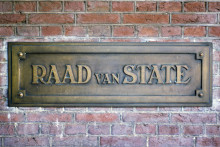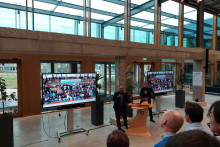Here and there, higher education is being stretched to its limits by the intake of international students, writes the advisory department of the Council of State in a recommendation published today. It had already backed the plan of introducing the option of limiting the number of students admitted to an English-taught programme track.
Labour market
The department also understands the minister’s wish of being able to assess whether existing and new Bachelor’s degree programmes in another language are ‘effective’. But in so doing, attention must also be paid to 'the future needs of society and the labour market.' Both nationally and in the region where an education institution is located.
Outgoing Minister Dijkgraaf wants to encourage institutions to collaborate and ‘self-regulate’ in the area of internationalisation. The advisory department thinks this is a good idea and even suggests making mutual consultation on their non-Dutch-taught programmes mandatory.
Legal certainty
The institutions do need to know what an assessment of their non-Dutch-taught programmes would involve. One thing that’s unclear in the current proposal, according to the advisory department, is whether the minister will take into account whether a programme has enough suitable staff, Dutch-speaking or otherwise.
Also, the explanatory notes with the bill state that the minister will only intervene in the existing non-Dutch-taught programmes as a last resort. But: 'From the perspective of legal certainty for the institutions' it would be better if the government put this in the act itself, the recommendation reads.
Exception for higher vocational education
The advisory department doesn’t see much reason to intervene in English-taught higher vocational programmes. There, the intake of international students has been fairly stable for years, and there are far fewer English-taught programmes than in higher education. This is why the department is advising not to have the effectiveness assessment apply to higher vocational education yet, or at the very least make the assessment less stringent.
Outgoing Minister Dijkgraaf says the Council of State’s recommendation is valuable and will provide a substantive response later. In his initial response, he emphasises that his bill allows for 'customisation (regional and otherwise), enabling us to attract (and retain) international talents in the places where they are sorely needed'.







